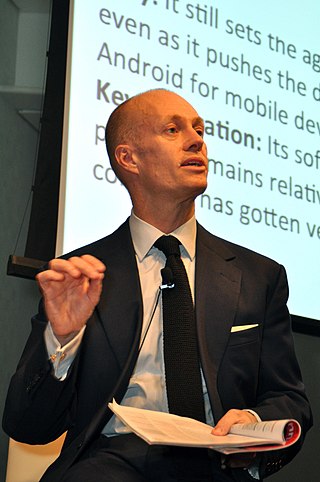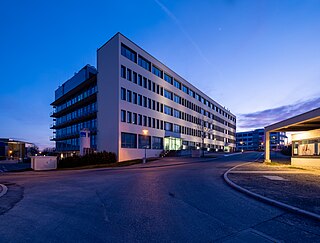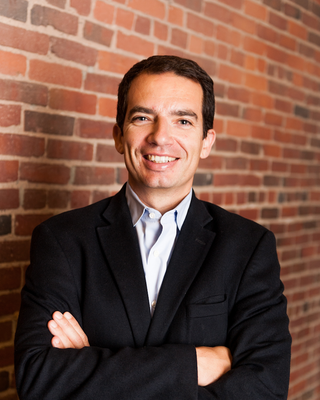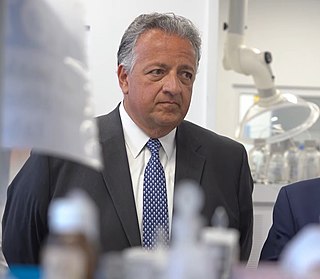Related Research Articles

Jason Matthew Daniel Pontin is a British-born venture capitalist and journalist. He is a General Partner at the venture capital firm of DCVC in Palo Alto, and is a board member and seed investor in a number of life sciences companies. He is the former editor in chief and publisher of MIT Technology Review.

Thermo Fisher Scientific Inc. is an American-headquartered life science and clinical research company. It is a global supplier of analytical instruments, clinical development solutions, specialty diagnostics, laboratory, pharmaceutical and biotechnology services. Based in Waltham, Massachusetts, Thermo Fisher was formed through the merger of Thermo Electron and Fisher Scientific in 2006. Thermo Fisher Scientific has acquired other reagent, consumable, instrumentation, and service providers, including Life Technologies Corporation (2013), Alfa Aesar (2015), Affymetrix (2016), FEI Company (2016), BD Advanced Bioprocessing (2018), and PPD (2021).

David Berry is an American entrepreneur and business executive. He has co-founded Valo Health, Seres Therapeutics, Indigo Agriculture, Axcella Health, and contributed to the early development of Moderna.
Atlas Venture is an early-stage venture capital firm that creates and invests in biotechnology startup companies in the U.S. Atlas is headquartered in Cambridge, Massachusetts, where the majority of its investments are located. Atlas raised its thirteenth fund totaling $450 million in March 2022, after raising its Opportunity Fund II totaling $300 million in September 2021.

Jennifer Anne Doudna is an American biochemist who has pioneered work in CRISPR gene editing, and made other fundamental contributions in biochemistry and genetics. Doudna was one of the first women to share a Nobel in the sciences. She received the 2020 Nobel Prize in Chemistry, with Emmanuelle Charpentier, "for the development of a method for genome editing." She is the Li Ka Shing Chancellor's Chair Professor in the department of chemistry and the department of molecular and cell biology at the University of California, Berkeley. She has been an investigator with the Howard Hughes Medical Institute since 1997.

CureVac N.V. is a German biopharmaceutical company. It develops therapies based on messenger RNA (mRNA). Headquartered in Tübingen, Germany, the company was founded in 2000 by Ingmar Hoerr (CEO), Steve Pascolo (CSO), Florian von der Mulbe (COO), Günther Jung, and Hans-Georg Rammensee. CureVac has approximately 375 employees since May 2018.

Moderna, Inc. is an American pharmaceutical and biotechnology company based in Cambridge, Massachusetts, that focuses on RNA therapeutics, primarily mRNA vaccines. These vaccines use a copy of a molecule called messenger RNA (mRNA) to carry instructions for proteins to produce an immune response. The company's name is derived from the terms "modified", "RNA", and "modern".

Third Rock Ventures is a venture capital firm with offices in Boston and San Francisco. Founded in 2007, the firm invests in biotechnology startups.

Feng Zhang is a Chinese–American biochemist. Zhang currently holds the James and Patricia Poitras Professorship in Neuroscience at the McGovern Institute for Brain Research and in the departments of Brain and Cognitive Sciences and Biological Engineering at the Massachusetts Institute of Technology. He also has appointments with the Broad Institute of MIT and Harvard. He is most well known for his central role in the development of optogenetics and CRISPR technologies.

Henri A. Termeer was a Dutch biotechnology executive and entrepreneur who is considered a pioneer in corporate strategy in the biotechnology industry for his tenure as CEO at Genzyme. Termeer created a business model adopted by many others in the biotech industry by garnering steep prices— mainly from insurers and government payers— for therapies for rare genetic disorders known as orphan diseases that mainly affect children. Genzyme uses biological processes to manufacture drugs that are not easily copied by generic-drug makers. The drugs are also protected by orphan drug acts in various countries which provides extensive protection from competition and ensures coverage by publicly funded insurers. As CEO of Genzyme from 1981 to 2011, he developed corporate strategies for growth including optimizing institutional embeddedness nurturing vast networks of influential groups and clusters: doctors, private equity, patient-groups, insurance, healthcare umbrella organizations, state and local government, and alumni. Termeer was "connected to 311 board members in 17 different organizations across 20 different industries" He has the legacy of being the "longest-serving CEO in the biotechnology industry.
Biotechnology in India is a sunrise sector within the Indian economy. Agencies of the Government of India concerned with the biotechnology industry include the Department of Biotechnology and the proposed Biotechnology Regulatory Authority of India. As of 2022, the sector is valued at $80 billion. Biotechnology in India is in a growth phase and the sector is expected to be valued at $150 billion by 2025 and surpass $300 billion in value by 2030.

Editas Medicine, Inc.,, is a clinical-stage biotechnology company which is developing therapies for rare diseases based on CRISPR gene editing technology. Editas headquarters is located in Cambridge, Massachusetts and has facilities in Boulder, Colorado.

Greater Boston, primarily Boston and Cambridge, is home to more than 1,000 biotechnology companies, ranging from small start-ups to billion-dollar pharmaceutical companies. The many universities in the area give the region a large network of scientists.

Intellia Therapeutics, Inc. is an American clinical-stage biotechnology company focused on developing novel, potentially curative therapeutics leveraging CRISPR-based technologies. The company's in vivo programs use intravenously administered CRISPR as the therapy, in which the company's proprietary delivery technology enables highly precise editing of disease-causing genes directly within specific target tissues. Intellia's ex vivo programs use CRISPR to create the therapy by using engineered human cells to treat cancer and autoimmune diseases.

Derrick J. Rossi, is a Canadian stem cell biologist and entrepreneur. He is a co-founder of the pharmaceutical company Moderna.

Rachel Elizabeth Haurwitz is an American biochemist and structural biologist. She is the co-founder, chief executive officer, and president of Caribou Biosciences, a genome editing company.

Stéphane Bancel is a French business executive. He is the chief executive officer (CEO) of the American pharmaceutical and biotechnology company Moderna, known for its COVID-19 vaccine. Before joining Moderna, Bancel was the CEO of French diagnostics company BioMérieux. Bancel is a partner at Flagship Pioneering, and has served on the boards of Indigo Agriculture, Boston's Museum of Science, and Qiagen. As of May 2023, his net worth was estimated at US$4.1 billion, owning about 8% of Moderna.

Noubar Afeyan is an American-Canadian entrepreneur, inventor, and philanthropist. He is best known for co-founding the biotechnology company Moderna, through his venture capital firm, Flagship Pioneering, and for co-founding humanitarian projects such as Aurora Prize and The Future Armenian. As of November 2021, his net worth is estimated at $3.3 billion.

CRISPR Therapeutics AG is a Swiss–American biotechnology company headquartered in Zug, Switzerland. It was one of the first companies formed to utilize the CRISPR gene editing platform to develop medicines for the treatment of various rare and common diseases. The company has approximately 500 employees and has offices in Zug, Switzerland, Boston, Massachusetts, San Francisco, California and London, United Kingdom. Its manufacturing facility in Framingham, Massachusetts won the Facilities of the Year Award (FOYA) award in 2022. The company’s lead program, exagamglogene autotemcel, or exa-cel, was granted regulatory approval by the US Food and Drug Administration (FDA) in December 2023.
The Innovative Genomics Institute (IGI) is a nonprofit scientific research institute founded by Nobel laureate and CRISPR gene editing pioneer Jennifer Doudna and biophysicist Jonathan Weissman. The institute is based at the University of California, Berkeley, and also has member researchers at the University of California, San Francisco, UC Davis, UCLA, Lawrence Berkeley National Laboratory, Lawrence Livermore National Laboratory, Gladstone Institutes, and other collaborating research institutions. The IGI focuses on developing real-world applications of genome editing to address problems in human health, agriculture and climate change.
References
- ↑ Fry, Erika (May 19, 2020). "How the biotech investor behind Moderna is using the 'immigrant mindset' to take on COVID-19". Fortune.
- 1 2 Stendahl, Max (December 15, 2016). "A new name and new fund will ensure Cambridge's Flagship 'feels like a startup'". Boston Business Journal.
- ↑ Saltzman, Jonathan (April 2, 2020). "VC firm Flagship Pioneering raises $1.1b for biotech startups, despite reeling economy". Boston Globe.
- ↑ National Research Council, Division on Earth and Life Studies, Board on Chemical Sciences and Technology, Committee on Challenges in Chemistry Graduate Education (2012). Challenges in Chemistry Graduate Education: A Workshop Summary. National Academies Press. p. 42. ISBN 978-0-309-25708-4.
{{cite book}}: CS1 maint: multiple names: authors list (link) - 1 2 Dunn, Andrew (May 23, 2020). "The untold story of Moderna as the biotech's coronavirus vaccine faces a test that could make it one of the most consequential startups of all time". Business Insider.
- ↑ "Companies". Flagship Pioneering. Retrieved 2021-04-21.
- ↑ DeAngelis, Allison (April 2, 2020). "With $1.1B in hand, life sciences investor Flagship rewrites its rulebook". Boston Business Journal.
- ↑ History of Cambridge: Innovation: Venture Capital
- ↑ Garde, Damian (November 10, 2020). "The story of mRNA: How a once-dismissed idea became a leading technology in the Covid vaccine race". Stat.
- ↑ Isaacson, Walter (2021). The Code Breaker . Simon & Schuster. pp. 208–213. ISBN 978-1-9821-1585-2.